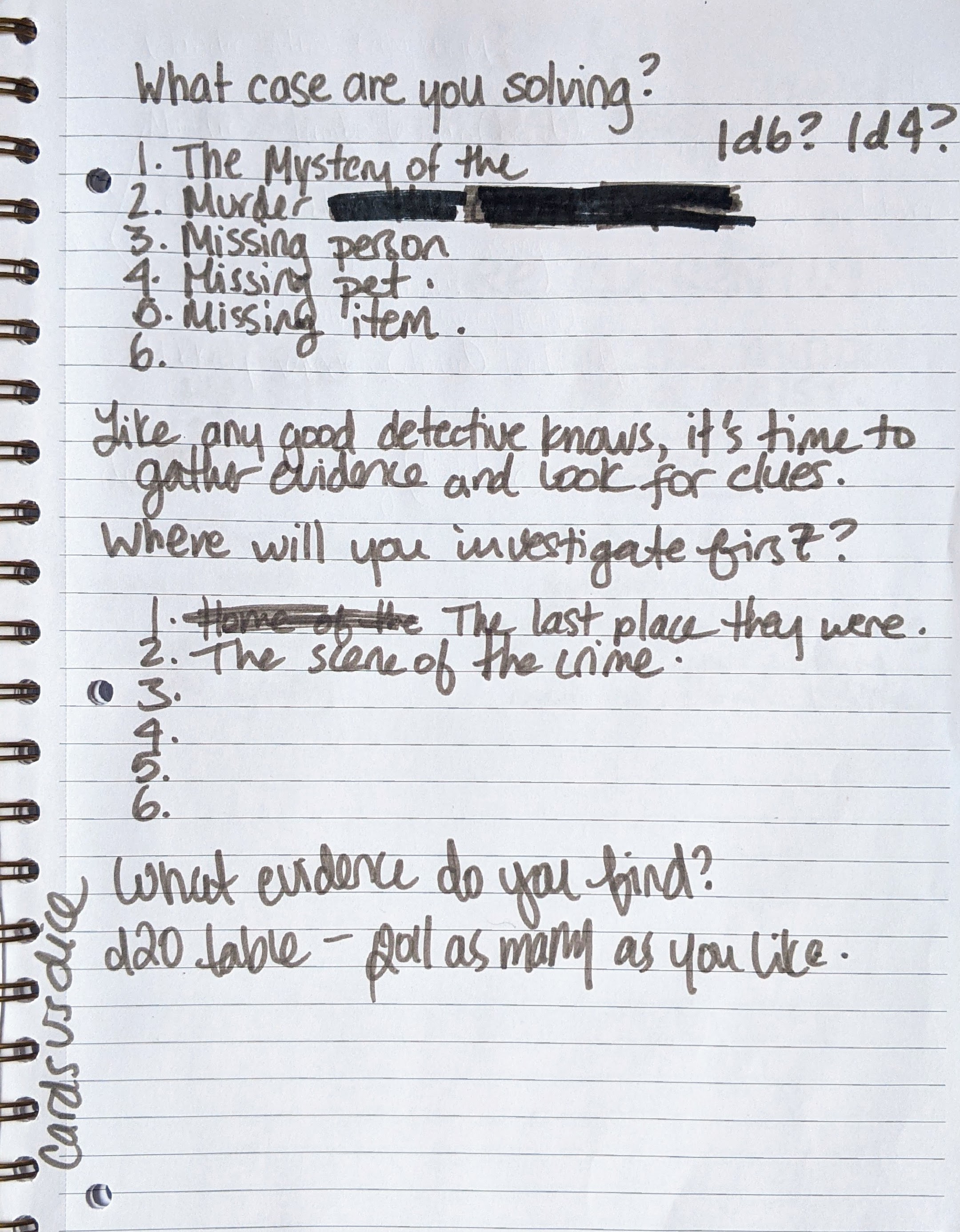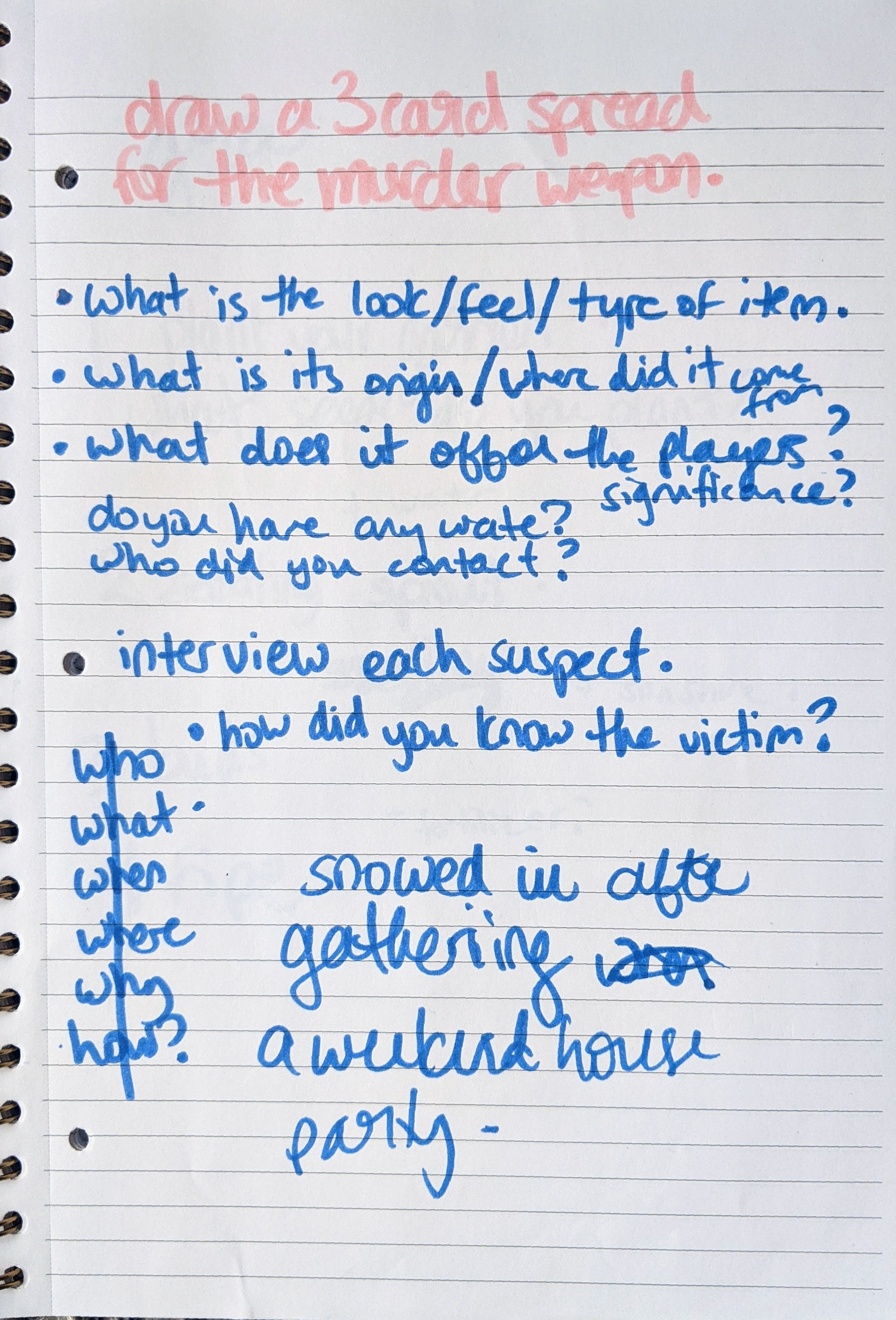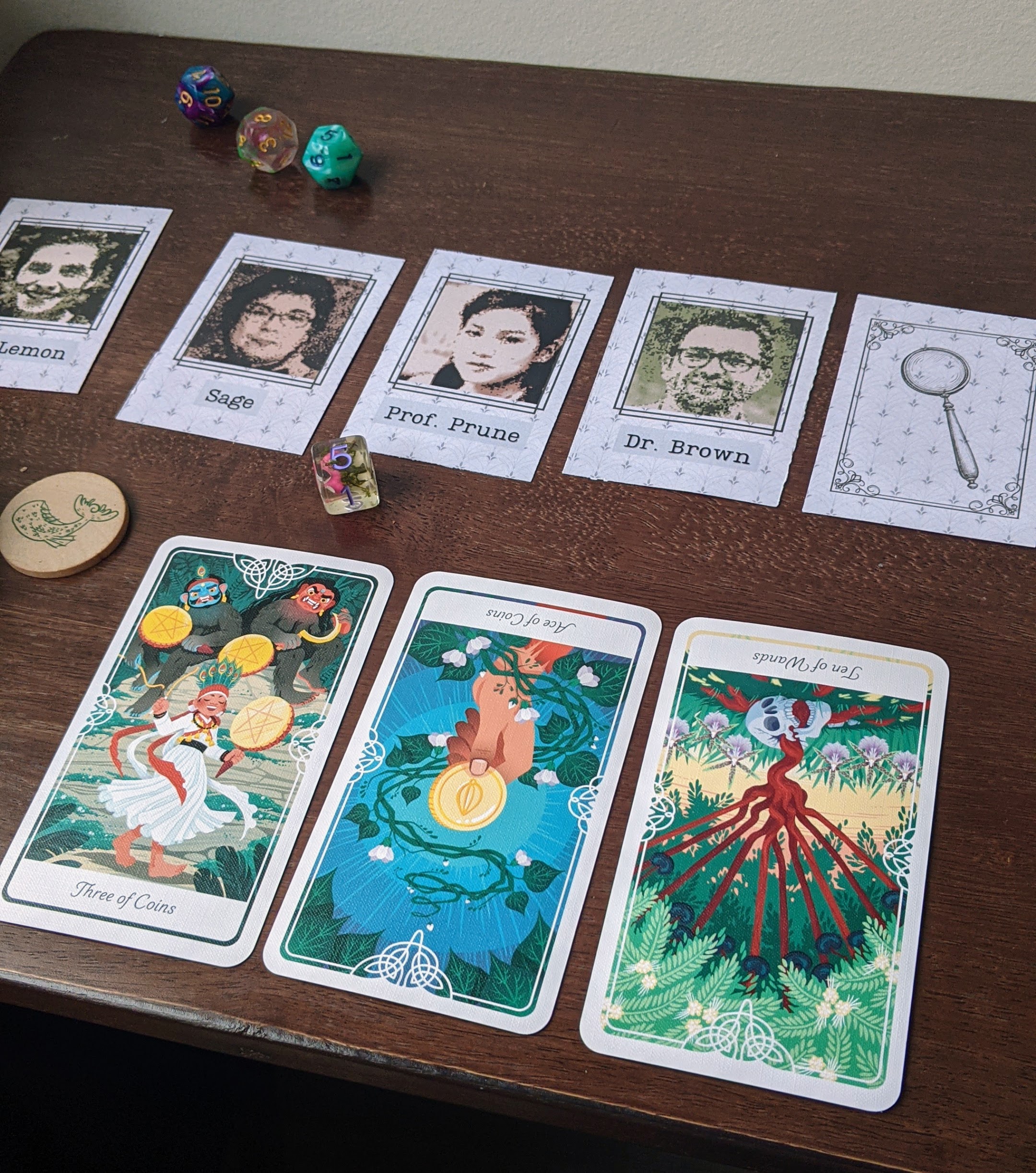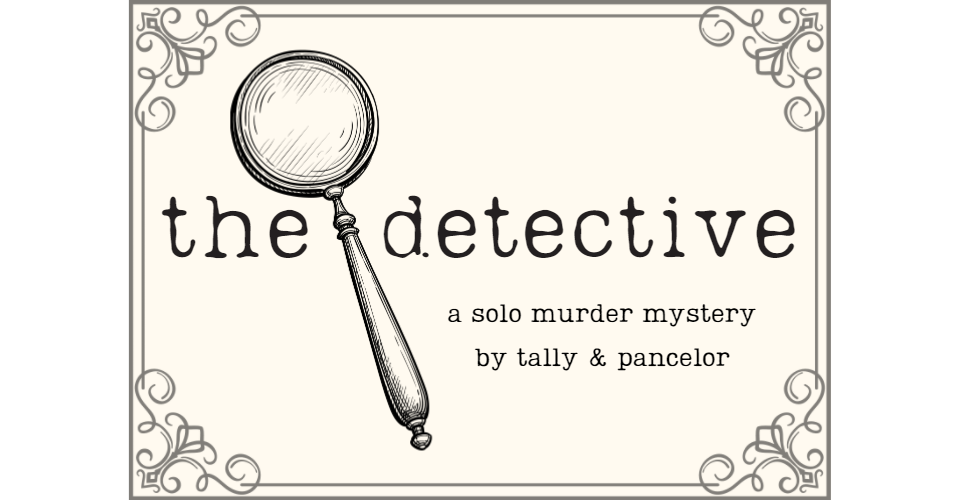Designer Diary
The board game Clue holds a special place in my heart. My family played it all the time on camping trips when I was a kid and it remains one of my favourite games. I wanted to make a mystery Clue-esque game for a while now, but nothing really clicked until The Detective.
One year ago, I stumbled upon the Rascals Jam and it seemed like the perfect push to make my murder mystery TTRPG a reality. My game started out with some d6 tables, with the player rolling for the type of case you might solve, where you might investigate, and what evidence you might gather. The idea was to make it a tight, punchy, one page RPG that would give you a few prompts to come up with a murder mystery on your own.

Early brainstorming in my notebook.
I considered doing a mystery with a set ending, similar to the Sherlock Holmes board games. I haven't played them personally, but discovered upon them while doing research for this game. You get cases to solve, but they are essentially one and done as once you know the solution, it doesn't change. This ended up being a deal-breaker for me: I wanted a game could be replayed.
Ultimately, the jam was to short for me to get anything substantial together, and I was so fond of this concept that I really wanted to do it justice. I didn't like the tables I'd come up. It felt too bare bones, like something was still missing gameplay-wise. There were too many gaps that needed to be filled by the player in a way that didn't feel good.
The game was put on the back burner and I ruminated on it while working on other projects. I had a vision growing of a choose-your-own adventure mystery where the player could find evidence and a culprit, and then replay it again with a completely different ending, but I wasn't sure how to go about that. A few months later, the idea of using tarot came to me, after playing some other lovely tarot-based games and getting my first tarot deck.
I love the concept of tarot in TTRPGs: how you can use the cards to generate so many unique ideas or prompts and how this can vary depending on what deck you have. I'd stayed away from it for a while mainly because I didn't have a deck of my own, but also because it felt overwhelming at first. I had no idea what any of these cards meant and learning the symbolism just seemed like so much work. I've sinced realized that it doesn't have to be that complex - the cards can be used to generate ideas even without knowing their traditional meanings. Tarot seemed like the best way to generate ideas while still having that 'random' aspect I love, and a great way to fill the gaps I was feeling in the previous versions of the game.
I eventually landed on the core system of you, the player, as the detective and a cast of characters (or "suspects" as the game was titled for a while) that you have to question in order to solve the mystery. This initally took the form of tarot spreads: drawing cards and laying them out in front of you and having questions tied to a corresponding card in the spread. I also didn't love this because it was hard to pick the questions for the spreads, and to have it all fit together and feel natural. I wanted the player to have a bit more freedom in the questions they were asking, rather than be forced to be asking some prescribed questions.
 More brainstorming in my notebook. I'm a fan of using marker and big writing when brainstorming - something about it really clicks with my brain.
More brainstorming in my notebook. I'm a fan of using marker and big writing when brainstorming - something about it really clicks with my brain.
The events (or omens as they are now called) came soon after - sure you're asking questions and solving the case but then twists and turns have to happen! The intrigue! The drama! This is where my co-designer pancelor came in.
In all my projects, pancelor has always been a big part of my creative process. I love bouncing ideas off of him and he is great to give me the craziest answer that will kick-start my brain out of whatever rut and get the creative juices flowing again. While we were brainstorming weird and wild events that might happen in a murder mystery setting, we got to talking and decided that this would be a game we'd collaborate on.
One of the biggest things pancelor did a lot of work to help figure out was just how long a game might run before you are pushed into the final act, thus ending the game. Once we had our event lists, next was thinking about the pacing of how often they would happen, and at what point the game would end. We created a 12x12 table where players roll after each question to see if they got an omen token, a piece of evidence, or nothing at all. I wasn't sure about the balance of the number of each symbol and what that would mean for how long or short the game would be. Pancelor created a tool that allowed us to simulate thousands of games at a time, see how many turns occurred (i.e. how many questions you get to ask the other guests), and how many pieces of evidence you collect with a given number of options.
 An example of the output given from pancelor's tool. The y-axis is the # of games and the x-axis is count (number of turns in blue, number of pieces of evidence in red).
An example of the output given from pancelor's tool. The y-axis is the # of games and the x-axis is count (number of turns in blue, number of pieces of evidence in red).
This was super helpful to be able to easily adjust numbers and see how it impacted the barebones gameplay. It was really challenging to find that sweet spot between long enough to have satisfying gameplay but short enough that the game ends while the player is still engaged. Even when we thought we had the game in a good place, in playtests it still ended up where one playtester got all omens and almost no evidence, and another playtester got all evidence and was losing interest before even getting their first omen. The choice tiles were later added to help balance this out a bit more. People play these sorts of games differently depending on what sort of game they are looking for! Some want to have a really in-depth experience to ask questions and write very long-form journal entries while others want the experience without several hours playtime. These choice tiles are our way of giving the player a bit more agency to decide if they wanted to keep gathering evidence or if they were ready for the game to move to the next act. The final addition was a clear statement that the player can choose to move on to the final Act at any time regardless of number of omens. Because of the randomness of the table, there is still the chance that someone could be stuck asking questions for much longer than they find fun. Giving this explicit out is one way to avoid this. I think that players could totally do this anyways, without it being explicitly written in the game's instructions, but sometimes it's nice to have it written out there anyways. Balancing stuff is really tricky, and it's hard to say whether the tiles have found that sweet spot, but I do think it's in a good place.
 A photo of one of our playtests.
A photo of one of our playtests.
Pancelor also made the guest cards, which I love! They were a relatively late addition, but I think it really adds a lot to the game. I had been playing around with the idea of using court cards from a traditional playing card deck as stand-ins, but making game-specific cards was a really great idea. Printing out the cards at the local print shop and using them in our playtests really added that extra something ✨ to gameplay. The characters on the cards were created using This Person Does Not Exist and then running that image through some paint.net filters, to produce the end result. We generated a bunch and then picked the ones that we felt best suited the names I'd already come up with (probably the most obvious Clue-inspired part of this game).
In the end, this game is something that I'm incredibly proud of and I think it really does live up to my original vision. Teaming up with pancelor and getting something more concrete going was probably the biggest thing that helped push this game along and out of the ideas rut it sat in for so long. Having the tool to generate games and adjust the numbers on the fly was helpful to feel like I had a decent understanding of more complex mechanics outside of more basic dice tables.
I hope you love playing this game just as much as I loved working on it (which was a lot!!).
- Tally
Files
Get The Detective
The Detective
A dinner party turns deadly & you must solve the mystery!
| Status | Released |
| Category | Physical game |
| Authors | tallywinkle, pancelor |
| Tags | murder-mystery, solo, Solo RPG, Tarot, Tabletop role-playing game |

Leave a comment
Log in with itch.io to leave a comment.